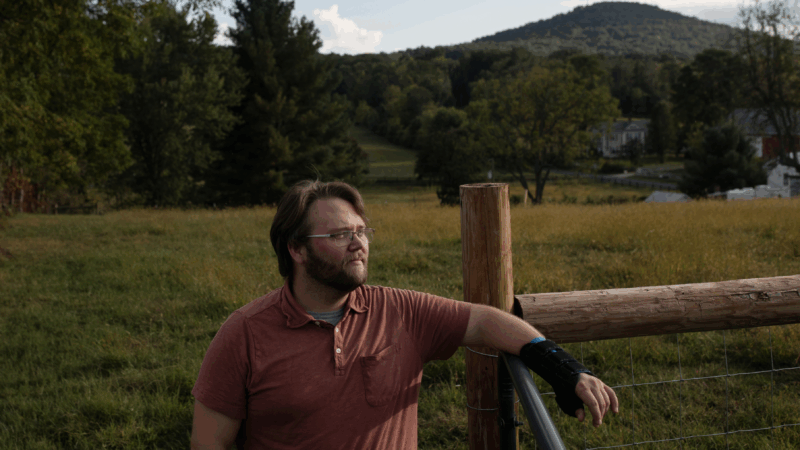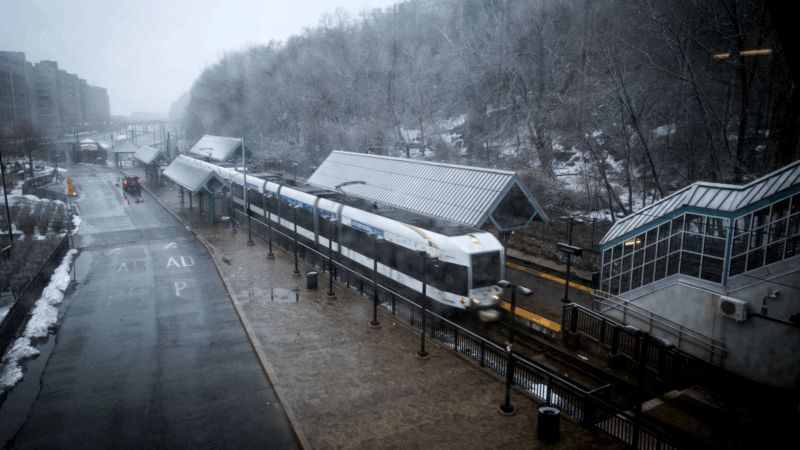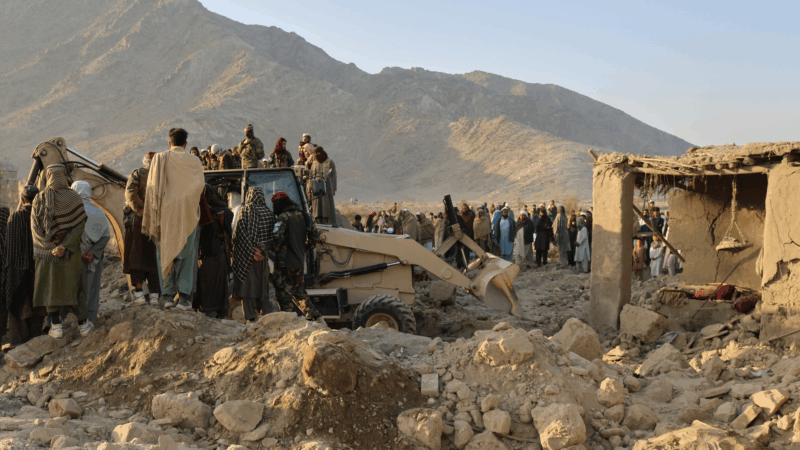In small towns and rural communities, young voters say they feel unseen by leaders
Andrew Tait has a long workday. He bookends shifts as a warehouse supervisor for a nearby factory with early morning and late night chores on his family’s small farm in rural Shenandoah Valley, Virginia.
He’s quick to call himself lucky. But no matter how much the 36-year-old father of two young girls works, he says they barely scrape by — and the goalposts for success keep moving.
“I have a mortgage, and it’s paid every month. But the thought of my children’s birthdays or holidays terrifies me,” Tait said. “What if the grocery bill goes up again? I mean, I’m on a shoestring.”

He’s among a generation of young Americans confronting a daunting reality: one of inflated prices and growing concerns about their financial futures. It’s an experience facing Gen Z and millennial voters throughout the U.S., each in their own unique ways. For those living in rural communities and small towns, it’s left many feeling as if their hardships have gone unseen and unaddressed by politicians vying for their support.
Over the summer, Tait decided to write an essay titled “Living in the Shadow of the American Dream.” In it, he shared that he and his partner have put off getting married because he worries that if they did, it would force her and their daughters off Medicaid, and his job’s healthcare plan is too expensive for the whole family to afford.
“I’m not ashamed of our life. It’s honest work, and it’s full of love,” Tait wrote. “However, I am ashamed that in a country as wealthy as ours, people like us are left out in the cold.”
By the next presidential election, Gen Z and millennials are projected to make up more than half of the electorate. But many, including Tait, say they’ve grown dissatisfied with political leaders as they wrestle longstanding financial concerns.

“I’m really just tired of voting for who I hate least,” said Tait, who declined to specify how he voted in the 2024 presidential election, but said politicians should focus on improving access to quality food, healthcare and education.
“I want somebody to inspire me,” he added. “It doesn’t matter if you’re red or blue, whatever side of the aisle you’re on, like, come on, guys, what do we want?”
It’s a common feeling for many young people today, and partially why President Trump’s economic message may have resonated with a greater share of young voters last year, says Lee Miringoff, director of the Marist University Institute for Public Opinion.
“He’s making connections with people who are very dissatisfied with the way things are. And therefore, being a candidate who’s going to disrupt and change things is a major attraction for a hunk of the electorate that is feeling that economic stress,” he said. “That’s perhaps most profound with younger people.”

But those economic pressures aren’t new to many in rural areas, says Nicholas Jacobs, a professor of government at Colby College. These communities have faced such issues for decades, though now, he argues, the difference is that the politics have changed.
“What I believe to be true from my surveying of rural populations and young people in rural areas is they don’t feel like they have two alternatives. They do not feel like the Democratic Party gives them a set of answers to those problems,” he said. “I don’t think most rural people feel like the Democratic Party even thinks about these problems.”
Doubting the American Dream
After growing up during periods of financial volatility and uncertainty, economic concerns have continued to loom large for Gen Z and millennial Americans.
Younger people collectively make up more than 60% of the labor force and are poised to surpass older generations in educational attainment.
However, many still worry about having successful lives. Seven in 10 Gen Zers say jobs are difficult to find right now, along with nearly 6 in 10 millennials, according to a Marist poll from April. An analysis from Pew Research Center last year also found that both generations are less likely to say the American dream is still possible, compared to the generations before them.
Housing is a major worry, with home and rental prices increasing at a faster rate than wages over the last two decades. The median age of a first-time homebuyer has also drastically increased, going from 28 in 1991 to 38 last year, according to the National Association of Realtors.
This combination of concerns has pushed some young Americans toward more left-leaning, populist ideas and caused others to feel unsatisfied by today’s political leaders.
“I don’t really think that there’s any one person who really is addressing it,” said Paul Staley, 35, who lives in a small town outside Birmingham, Alabama with his wife and kids.
He’s one of more than a thousand young people who responded to an NPR callout about how economic concerns have shaped their lives.
Staley works as a field service engineer fixing medical equipment. Raised in a blue-collar household, he can see clear differences between his life and that of his father.
“He could afford a brand new Corvette as a butcher, but these days, me with a college degree and 10 years of experience, I couldn’t hope to really afford a brand new car like that,” he said. “The difference is too great. You don’t have that same type of opportunity.”
Staley previously voted for Trump but says he has since gravitated more towards the political center, acknowledging that while he remains interested in the president’s economic agenda and did benefit from his tax cut policy, he wants to see additional action on things like rising costs and worker protections.
Those two issues in particular have drawn him more recently to Sen. Bernie Sanders, I-Vt., and Zohran Mamdani, the Democrats’ nominee for mayor in New York.
“These issues are pushing people to their ideological — I don’t want to say extremes — but to the end of the political spectrum … I think the answer lies more somewhere in the middle,” he said. “Hard work needs to mean more.”
Feeling left behind
For others, what matters is opportunities, rather than politics.
Julie Hill, 22, lives in rural northwest Pennsylvania. She says politicians often overlook communities like hers.
“It can be hard to kind of feel like we’re being seen,” said Hill, who identifies as an independent but voted for former Vice President Kamala Harris last year. “It seems like rural areas get left behind sometimes.”
Hill is unemployed, currently part of an outpatient rehab program as she deals with mental health challenges, and she’s also had to support herself financially after losing family in recent years.
Her dream is to own a home one day, with enough land to raise animals. She loves horses and is still pained by the memory of having to give up her own horse as a teenager when finances got tight.
That said, Hill admits that homeownership is far away for her, recalling that all the homeowners she knows either inherited land or bought decades earlier when prices were lower.
“They kind of had that support upfront. They had a place to kind of start out, I guess, whereas I’m starting from complete scratch,” she said. “It seems like even just an acre around here is as much as a house was like probably 30, 40 years ago.”
Hill wants to have hope that her American dream can become a reality, but says it doesn’t feel possible right now.
“The story of Sisyphus and the rock, that’s kind of what it feels like. You’re just pushing that rock up every day just to have it roll back down again,” she said. “I’ve felt like that for a long time, so be nice to be able to get the rock up top and then be able to start building.”
Northeast readies for a major winter storm, with blizzard warnings in effect
New Jersey through Massachusetts could see 2 feet of snow. New York City's mayor said the city had not "seen a storm like this in a decade."
Mexican army kills leader of Jalisco New Generation Cartel, official says
The Mexican army killed the leader of the powerful Jalisco New Generation Cartel, Nemesio Rubén Oseguera Cervantes, "El Mencho," in an operation Sunday, a federal official said.
Ukraine’s combat amputees cling to hope as a weapon of war
Along with a growing number of war-wounded amputees, Mykhailo Varvarych and Iryna Botvynska are navigating an altered destiny after Varvarych lost both his legs during the Russian invasion.
University students hold new protests in Iran around memorials for those killed
Iran's state news agency said students protested at five universities in the capital, Tehran, and one in the city of Mashhad on Sunday.
Pakistan claims to have killed at least 70 militants in strikes along Afghan border
Pakistan's military killed at least 70 militants in strikes along the border with Afghanistan early Sunday, the deputy interior minister said.
Team USA faces tough Canadian squad in Olympic gold medal hockey game
In the first Olympics with stars of the NHL competing in over a decade, a talent-packed Team USA faces a tough test against Canada.






